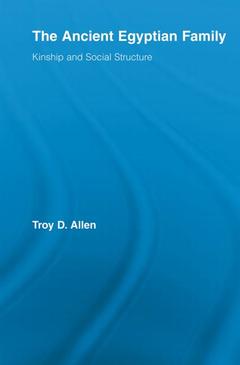Description
The Ancient Egyptian Family
Kinship and Social Structure
African Studies Series
Author: Allen Troy D.
Language: English
Keywords
Ancient Kemet; society; Social Organization; kinship; Ancient Egyptian Society; terms; Gardiner Sign List; cheikh; Matrilineal Family; anta; Ancient Egypt; diop; Afrocentric Perspective; matrilineal; Kinship Terminology; kemet; Eighteenth Dynasty; thhile; Afrocentric Paradigm; obenga; Ancient Egyptian Civilization; Black Africa; Kinship Terms; Ramses III; Black African Societies; Ivory Coast; Kemetic Civilization; Consanguineous Marriages; Marriage Union; Afroasiatic Family; Classical African Civilizations; Middleton’s Article; Egyptian Kinship; Proto Cultures; Diop’s Work
Publication date: 02-2012
128 p. · 15.2x22.9 cm · Paperback
Publication date: 12-2008
· 15.2x22.9 cm · Paperback
Description
/li>Contents
/li>Biography
/li>Comment
/li>
Scholars in Egyptology have often debated the following question: was the ancient Egyptian society organized along patrilineal or matrilineal lines? In taking a fresh and innovative look at the ancient Egyptian family, Allen attempts to solve this long-standing puzzle. Allen argues that the matrilineal nature of the ancient Egyptian family and social organization provides us with the key to understanding why and how ancient Egyptian women were able to rise to power, study medicine, and enjoy basic freedoms that did not emerge in Western Civilization until the twentieth century. More importantly, by examining the types of families that existed in ancient Egypt along with highlighting the ancient Egyptians' kinship terms, we can place the ancient Egyptian civilization in the cultural context and incubator of Black Africa. This groundbreaking text is a must-read for Historians and those working in African Studies and Egyptology.
1. The Egyptian Foundation 2. The Historical Context 3. The Family in Ancient Egyptian Society 4. Description of Ancient Egyptian Kinship Terms 5. Egypt and Other African Cultures 6. A Discussion of Cheikh Anta Diop’s Two Cradle Theory 7. Conclusion
Troy D. Allen is an Associate Professor in the Department of History at Southern University. There, he teaches courses in African-American History, World Civilizations (Honors), and the History of Ancient Egypt, along with a course on Race Relations. Dr. Allen is the author of many articles, and also serves on the Editorial Board of the Journal of Black Studies. He recently edited a Special Edition of the Journal of Black Studies focused on the issues of Race, Class, and Poverty in the aftermath of Hurricane Katrina




